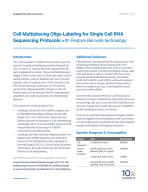The 10x Genomics 3’ CellPlex Kit provides a species-agnostic sample multiplexing solution through the use of a set of 12 Feature Barcode oligonucleotides each conjugated to a lipid. These Cell Multiplexing Oligos can be used to label individual cells or nuclei samples, and the labeled cells can be pooled together prior to loading onto a 10x Genomics chip. The Feature Barcode molecules can be directly captured by oligonucleotides present on the Gel Beads inside a GEM during GEM-RT, subsequently amplified, and used to generate Cell Multiplexing libraries.
This protocol provides guidance for:
- Labeling cells/nuclei with CellPlex reagents (see page 2-3, Cell Multiplexing Oligo Labeling) for use with Single Cell 3'v3.1 (Dual Index) protocols with Feature Barcode technology for Cell Multiplexing (CG000388) and Single Cell 3' v3.1 (Dual Index) protocols with Feature Barcode technology for CRISPR Screening & Cell Multiplexing (CG000389).
- Labeling cells with antibody-oligonucleotide conjugates and CellPlex reagents (see page 4-5, Cell Surface Protein & Cell Multiplexing Oligo Labeling) for use with Single Cell 3' v3.1 (Dual Index) protocols with Feature Barcode technology for Cell Surface Protein & Cell Multiplexing (CG000390).
Important
This protocol has only been validated with nuclei isolated using Demonstrated Protocol CG000124, which is the supported protocol for isolating nuclei from cells or fresh tissues for use with the Chromium Single Cell 3' Gene Expression assay. This protocol is NOT compatible with nuclei isolated from snap-frozen tissues. Isolating nuclei from snap-frozen tissues can be technically challenging, and nuclei can easily become damaged.
